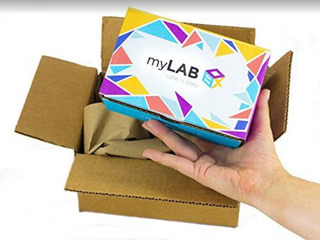Oxford Cancer Analytics raises $11M to detect lung cancer via a blood test
OXcan combines proteomics and artificial intelligence for early detection
Read more... At-home testing has been around for a few years, with companies like Everlywell and LetsGetChecked offering kits that allowed patients to test for conditions such as STDs, cholesterol, lipids, diabetes, and thyroid conditions, all without ever needing to leave the house. It's been a growing space but, like other aspects of digital health, it exploded over the last year.
At-home testing has been around for a few years, with companies like Everlywell and LetsGetChecked offering kits that allowed patients to test for conditions such as STDs, cholesterol, lipids, diabetes, and thyroid conditions, all without ever needing to leave the house. It's been a growing space but, like other aspects of digital health, it exploded over the last year.
Now LetsGetChecked is looking to grow beyond being an at-home testing company to becoming a full service digital platform, and it's raised a big new funding round to implement that strategy.
On Tuesday, the company announced a $150 million Series D round, was led by Casdin Capital, along with existing investors CommonFund Capital, Illumina Ventures, Optum Ventures, Transformation Capital, HLM Venture Partners, Qiming Venture Partners USA, and professional golfer Rory Mcllroy through Symphony Ventures. This brings LetsGetChecked's total capital raised to more than $260 million.
Founded in 2015, LetsGetChecked currently offers over 100 at-home wellness and chronic condition tests that can be administered by the patient without needing to see a doctor; that includes test for diabetes, cholesterol, thyroid, cancer screening, sexual health, fertility, and pharmacogenomic testing.
Once a test is purchased, users collect samples at home and send it back to LetsGetChecked's facility at no additional cost. Patients are able to get their results online within a few days.
The company, which is co-headquartered in Dublin and New York, has made its tests available nationwide in the United States and most EU countries; it has delivered more than two million tests and served more than 300 corporate customers. In 2020, LetsGetChecked grew its revenue by more than 1,500 percent.
Now that it has this new funding, LetsGetChecked plans to launch what it calls "care pathways," which basically means it will be a full-scale digital health platform that involves a telehealth solution allowing asynchronous chat and video consultations between patients and LetsGetChecked-affiliated medical providers. Patients will be able to do a follow-up consult if their tests are abnormal, as well as speak with a physician to get a prescription refilled or adjusted, and to receive follow-up care.
The company also plans to expand its pharmaceutical services to include long-term care solutions for conditions such as cholesterol and thyroid management; to facilitate this, the company is currently in the process of acquiring a pharmacy in Jupiter, Florida.
“We are seeing unprecedented demand for at-home diagnostics and care as an alternative to traditional in-person medical visits, and we are expanding our offerings to include telehealth and treatment services to further help people live longer, happier lives,” Peter Foley, Founder and CEO of LetsGetChecked, said in a statement.
Companies in the at-home testing market
Perhaps the best known company in the at-home testing space is 23andMe, which has raised over $868 million. The company's tests that assess genetic risks for 10 health conditions, including Parkinson's and late-onset Alzheimer's diseases.
The other big force in this space is Everlywell, which has raised $275 million across three rounds of funding over the last year, including a $175 million round in December; it has raised $325 million in total. Everywell provides at-home testing for over 30 conditions, including food sensitivity, STDs, cholesterol and lipids, HPV, thyroid conditions, Lyme disease, and fertility, among others.
There's also Reperio Health, which raised $6 million in March. The company developed an at-home health assessment and biometric screening system, allowing individuals to measure their own levels of total cholesterol, HDL, LDL, triglycerides and glucose, in addition to tests for blood pressure, resting heart rate, Body Mass Index and Relative Fat Mass.
(Image source: letsgetchecked.com)
OXcan combines proteomics and artificial intelligence for early detection
Read more...Nearly $265B in claims are denied every year because of the way they're coded
Read more...Most expect to see revenue rise, while also embracing technologies like generative AI
Read more...



